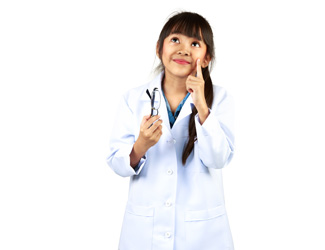Understanding Chronic Headaches in Children
When your child has recurring headaches, it’s natural to worry about worst-case scenarios. Whether we are the first headache specialists your child visits or you are seeking a second opinion, our pediatric headache specialists address your concerns and work with you and your child to help them feel better.
Migraines or Tension Headaches
In many cases, children experience primary headaches such as a migraine or tension headaches. These can be managed with an effective treatment plan designed to minimize their frequency and the severity of their symptoms.
Secondary Headaches that Result from Injury or Illness
If your child experiences secondary headaches (headaches that are the result of an injury or other illness), we coordinate the necessary evaluations with the appropriate pediatric specialists. We work together to provide headache treatment so your child gets relief.
Chronic Headache Treatments
Your child’s comprehensive evaluation will include a headache and medical history, as well as a thorough neurological exam. A migraine disability scale will be completed by the caregiver and reviewed during the visit. This questionnaire evaluates how disabling headaches are for your child. Additional diagnostic testing may be ordered if needed.
Behavioral Therapies
Behavioral therapies, such as cognitive behavioral therapy (CBT), provide additional support to help decrease disability and improve functionality in a child with headaches. Children who experience depression or anxiety are referred to a local psychologist and/or psychiatrist.
Headache Medication
Children with frequent headaches may be prescribed daily headache medications to decrease the severity and frequency of their headaches. Episodic medications are also recommended to treat headaches when they happen, to relieve pain and other symptoms related to a headache.
Botulinum Toxin (Botox) Injection
Botulinum toxin A (Botox) treatments may be recommended for children age 12 and older who have chronic migraine headaches that have not responded to other treatments. Although the reasons why Botox works are not well understood, there is strong evidence that it can effectively reduce the number and severity of migraine headaches.
Complementary and Alternative Therapies
Vitamins and supplements may play a role in reducing the severity and frequency of headaches. Biofeedback, acupuncture, yoga, physical therapy, and mindfulness training may also be recommended. We provide referrals to appropriate community resources if these therapies are part of your child’s treatment plan.
Migraine Action Plan
We help create a Migraine Action Plan to ensure that your child receives prompt treatment at school at the earliest signs of a migraine. The plan helps office staff and school nurses determine quickly if your child needs prescribed medicine, so a headache doesn’t progress and cause your child unnecessary pain or significant missed class time.

